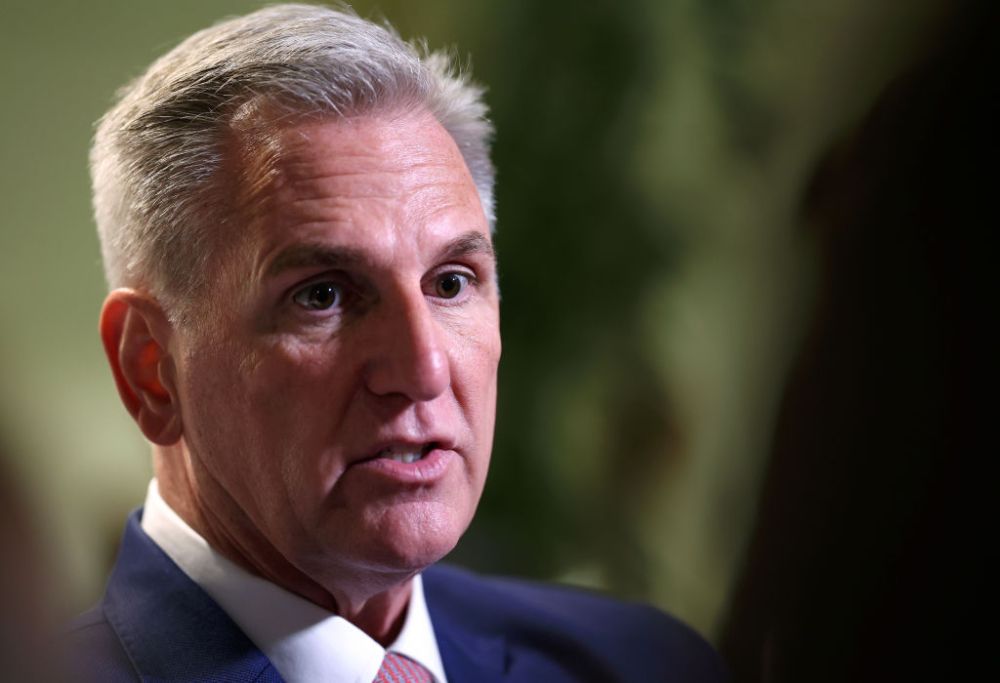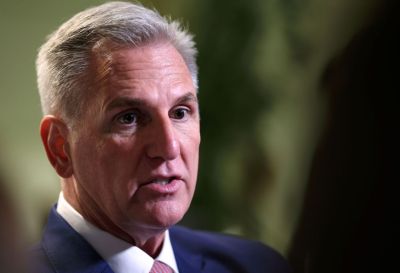Both houses of Congress are back from summer recess, yet lawmakers are no closer to completing their most basic task: funding the federal government for the next fiscal year. And House Speaker Kevin McCarthy’s announcement Tuesday that he’s opening an impeachment inquiry into President Joe Biden adds another layer of complexity to House Republicans’ already brittle majority.
Opening the inquiry gives House GOP investigators more legal weight to pursue records that could show links between Hunter Biden’s business dealings and the president. Until now, the Republicans investigating the Biden family’s business dealings could only request records ostensibly linked to some legislative purpose. A formal impeachment inquiry gives lawmakers wide latitude to request more records, such as banking and financial documents. They can also more easily subpoena witnesses who may have knowledge of the Biden family’s business dealings.
While the lines between a regular legislative investigation and an impeachment inquiry overlap, an impeachment inquiry is more likely to give lawmakers access to grand jury materials, documents and testimony related to the president’s actions, and communications covered by executive privilege, according to the nonpartisan Congressional Research Service.
“It gives us the ability to actually start getting to be more forceful … forcing the administration to start responding to the inquiries we had,” Rep. Kevin Hern, an Oklahoma Republican, told The Dispatch Thursday.
But McCarthy’s decision to open the impeachment inquiry on his own without an authorization vote from the entire House could open the door for the Biden administration to challenge Republican subpoenas. In 2019, when then-House Speaker Nancy Pelosi opened an impeachment inquiry into former President Donald Trump, the Justice Department’s Office of Legal Counsel issued an opinion saying the inquiry—and resultant subpoenas—was invalid because the House had not formally voted to authorize it. Five weeks later, the House voted to endorse the impeachment inquiry into Trump.
Most lawmakers were reluctant to say McCarthy’s impeachment inquiry will end in a vote floor vote, which would put the 18 GOP representatives from districts Biden won in 2020 in an uncomfortable position. GOP investigators will need to make a convincing case to moderates in those districts, one GOP aide told The Dispatch.
But it seems unlikely that McCarthy and his Republican leadership team will back away from an eventual vote on articles of impeachment.
“I can tell you, they didn’t come to that with the intention of not going through with it,” Rep. Mark Green, a Tennessee Republican, tells The Dispatch.
Before leaving Washington Thursday ahead of the Rosh Hashanah holiday, plenty of Republicans maintained that opening the inquiry now is more about fact-finding than voting to impeach. “It’s an impeachment inquiry. It’s not impeachment,” Rep. Bruce Westerman, an Arkansaw Republican, told The Dispatch.
“We’ll see where the facts lead us, that’s all you can do,” Rep. Ann Wagner, a Missouri Republican, told The Dispatch.
And McCarthy will still have to convince impeachment skeptics like Colorado Republican Rep. Ken Buck.
But the most strident GOP members have already made up their minds. “Biden is not innocent,” Rep. Marjorie Taylor Greene told reporters Thursday before referencing the federal indictment of Hunter Biden. Prosecutors say the younger Biden lied on a federal firearms form and to a federally licensed gun dealer, and also possessed a firearm illegally.
“There’s a lot more to come,” Greene said. “But we will be tying Joe Biden in. There’s not a timeline. We’re gonna be doing this for as long as it takes.”
Shutdown Watch
Meanwhile, Congress has less than two weeks to avert a shutdown of the federal government. And the prospects for doing so don’t look good after a group comprised mostly of members aligned with the House Freedom Caucus (HFC) decided to make McCarthy’s first week back from recess as painful as possible.
The HFC—citing frustrations with government spending and a sense of betrayal over the debt ceiling deal McCarthy worked out with Biden earlier this year—have withheld their support for a continuing resolution to temporarily fund the government when appropriations end late this month. The group has called for funding to revert to pre-pandemic levels. Rep. Matt Gaetz, the Florida Republican who isn’t a House Freedom Caucus member but has long been a McCarthy critic, has called on Democrats to support a motion to vacate the chair—a procedure to remove the House speaker from that position, which McCarthy himself agreed to bring back in order to secure his election to the post.
McCarthy essentially called what he hopes is Gaetz’s bluff Thursday morning in a special conference meeting “If you think you scare me because you want to file a motion to vacate, move the f—ing motion,” Politico reported the speaker as saying.
But the tense meeting didn’t initially appear to have convinced members seemingly itching for a shutdown or McCarthy’s critics to back down. “We’ll sit all day long with a shutdown,” Rep. Ralph Norman, an HFC Republican, said Thursday. He later told reporters: “We’re going to have a shutdown, it’s just a matter of how long.”
By the end of the day, there were some glimmers of hope.
A small coterie of House Freedom Caucus members and Main Street Caucus Republicans—a group of over 70 self-described pragmatic conservative lawmakers—met for several hours later Thursday. They discussed a 30-day continuing resolution that would fund the government while pairing some key conservative priorities, such as most of the Secure the Border Act, with disaster relief aid. It’s unclear what the disaster relief aid would include, but the White House has requested $16 billion to replenish the Federal Emergency Management Agency’s depleted funds. It would also include cuts to domestic funding that hardliners want to see in new appropriations measures. According to the Washington Examiner, the HFC-members included Texas Rep. Chip Roy, Pennsylvania Rep. Scott Perry, and Florida Rep. Byron Donalds. The Main Street Caucus members were North Dakota Rep. Kelly Armstrong, Oklahoma Rep. Stephanie Bice, and South Dakota Rep. Dusty Johnson.
“The Republican Main Street Caucus and the House Freedom Caucus are working together in good faith to establish a plan to lower spending, secure the border, and avoid a government shutdown,” Johnson and Bice, respectively the chairman and vice chairwoman of the Main Street Caucus, said in a statement. “The talks have been productive and we’ll continue to work toward a deal.”
Still, with some HFC members dug in, it’s unclear whether all of McCarthy’s critics will get on board. “I disagree that we can’t get spending levels where we want,” Norman told Punchbowl News. When asked if he expected the White House and the Senate to move in HFC’s direction on spending cuts, he responded, “I don’t.”
It’s unclear whether the talks will be the escape hatch McCarthy is looking for, but lawmakers may be in for some long days if an agreement isn’t forthcoming soon. McCarthy also told members that when they return next week they should be prepared to stay on the Hill.
“We’re not going to leave until we get the job done,” he told reporters.
Senate Unity Stutters
On Wednesday, the Senate seemed free from the drama paralyzing the House: Senators had approved an initial procedural vote on a “minibus” that bundled three bills funding the government on a bipartisan basis.
But that changed on Thursday when Sen. Ron Johnson, a Wisconsin Republican, objected to the chamber moving forward on its first package of appropriations bills, which were set to advance in a vote that day. Instead, Johnson wants to move the bills one by one.
The minibus itself would not have prevented an impending government shutdown. But it represents the Senate’s first move to handle its part of appropriations for the next fiscal year. They would still have to consider the remaining appropriations bills for fiscal year 2025 government funding, a process they won’t finish before government funding expires September 30. Lawmakers’ plan is to, at some point, move on a stopgap continuing resolution that will keep the lights on for however long it takes to wrap up the appropriations process.
The agreement he torpedoed would have taken the a military and veterans affairs bill, which had already sailed through another procedural vote that morning with 91 votes in favor, and essentially packaged two other bills, one dealing with agriculture and the Food and Drug Administration, and the other dealing with transportation and the Department of Housing and Urban Development, into a minibus that would have cost around $280 billion. Senate leaders planned to pass it as soon as next week.
Johnson’s objection prevented Senate leaders, in this case Appropriations Chair Patty Murray, a Democrat from Washington, from using unanimous consent to bundle the bills, which was the easiest way to get the bill through. They also could have tried to cobble together the necessary two-thirds supermajority of the Senate to suspend the rules and advance the trio of bills at once. But both that option and breaking the bills apart will cost the Senate time, which is running low ahead of September 30, the end of the current fiscal year.
“The Senate has been broken as long as I have served. The level of dysfunction is grotesque,” Johnson said. “Spending is completely out-of-control, and putting a minibus on the floor three weeks before the end of the fiscal year can hardly be called regular order.”
When it comes to appropriations, regular order entails all 12 appropriations bills being debated and passed separately. The last time Congress funded the government via regular order was in 1997.
Some Republican colleagues shared Johnson’s objections, including Sen. Mike Braun of Indiana. Others took to the floor to complain about the move. Sen. Susan Collins, a moderate Republican from Maine, told reporters Johnson’s move “ignores the reality that each of the 12 bills was reported separately independently.”
In other words, each of the 12 bills was written, debated, and passed (or reported out) through the relevant committee.
“We don’t have time to take each bill individually to the floor or we’re going to end up with either an omnibus, a government shutdown or a yearlong continuing resolution, which would fund programs that shouldn’t be funded anymore and prevent new programs from starting up,” she said.
Senate Majority Leader Chuck Schumer excoriated the hold-outs: “You have a small little group here in the Senate trying to mimic the Freedom Caucus in the House and trying to even slow up a usually bipartisan appropriations bill.”
Presented Without Comment
Of Note
Our email forwarding push wraps up today. If you think someone in your life might appreciate what we’re doing, go ahead and send them this email and encourage them to click the “sign up for this newsletter” link near the top. To do more of the kind of work we want to do, we need more members. And the best way to get more members is word of mouth from the people who know us best. Thanks for your help.





Please note that we at The Dispatch hold ourselves, our work, and our commenters to a higher standard than other places on the internet. We welcome comments that foster genuine debate or discussion—including comments critical of us or our work—but responses that include ad hominem attacks on fellow Dispatch members or are intended to stoke fear and anger may be moderated.
With your membership, you only have the ability to comment on The Morning Dispatch articles. Consider upgrading to join the conversation everywhere.